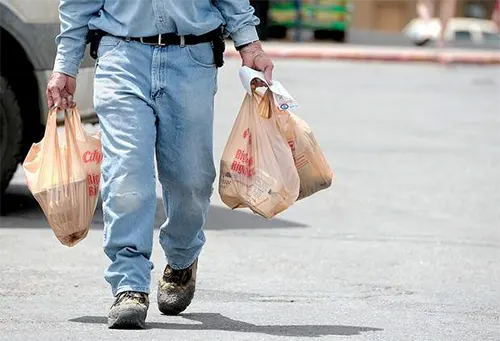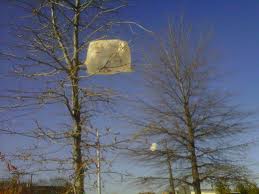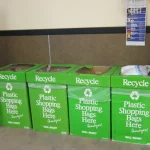What’s The Problem with Disposable Plastic Bags Anyway?

Wondering How Single-Use Plastic Bags Harm the Environment? Here’s Your Answer
Disposable plastic bags are deserving of the bad reputation they’ve garnered. They use up valuable non-renewable resources during the manufacturing process while also releasing dangerous greenhouse gases, and they are not biodegradable, so they never really go away.
After single-use plastic bags are used to carry a purchase home from the store, there are a couple of possible outcomes and some worse than others but ultimately, all of the results have harmful consequences. There are so many problems that stem from disposable plastic bags and the best solution is to phase these environmental hazards out in favor of reusable bags.
Looking for Reusable Bags for your business, brand, or retail outlet? Check out our many options!
Disposable Plastic Bags and Landfills Don’t Mix
Many of the disposable plastic bags put into circulation are likely to end up in a landfill. Unfortunately, most of the time empty bags are tossed in the trash or sometimes the bag is used as a garbage bag but either way, the landfill is no place for a disposable plastic bag. Disposable plastic bags will sit in the landfill and eventually the elements will degrade the plastic but it only breaks apart into smaller and smaller pieces of plastic.
The plastic fragments may leach into the soil and in turn, our groundwater or mistakenly be eaten by an animal, possibly entering our food chain or they may just sit there. And as more plastic piles up, the landfill grows into a bigger and bigger heap.

The Likelihood of Single-Use Plastic Bags Ending Up as Litter
The unfortunate reality is that there are so many of the disposable plastic bags unleashed on the world are going to end up as litter. Through carelessness or just not understanding the gravity of what they are doing, people without thinking will take a bag at checkout, then discard it. Gusts of wind may lift the bags out of garbage cans, recycling bins, or landfills and the odds are pretty good that a single-use plastic bag will end up as litter if not in a landfill.
Once the disposable bag is officially litter it can be lodged in a tree, billow down a sidewalk, or touch down in a canal, lake, stream, or other body of water. Regardless of where litter ends up, it is a danger to animals that may mistake it for food or become stuck in the disposable bag – this can seriously jeopardize the animal’s health and safety. Discarded disposable plastic bags can also clog canals, sewers, and drainage systems and this can cause major issues, such as flooding which can be an expensive, dangerous, and time consuming to fix.
Recycling Offers Somewhat of a Reprieve but Odds Are Low They Will Be Recycled
The recycling rate of disposable bags is continually rising and this is definitely good news. Recycling is a positive solution, but unfortunately, the plastic film material will just be turned into a new disposable plastic bag and these new bags will run the risk of causing environmental damage and harm.
 Recycling is the best course of action regarding single-use plastic bags that are already in existence, but the process is somewhat cumbersome – the bags can easily become tangled in equipment and this can slow the entire process down. It is not environmentally responsible to continue to produce single-use plastic bags and while recycling is the best manner to deal with disposable plastic bags, it does not offer a long-term or eco-friendly solution to the plastic bag problem.
Recycling is the best course of action regarding single-use plastic bags that are already in existence, but the process is somewhat cumbersome – the bags can easily become tangled in equipment and this can slow the entire process down. It is not environmentally responsible to continue to produce single-use plastic bags and while recycling is the best manner to deal with disposable plastic bags, it does not offer a long-term or eco-friendly solution to the plastic bag problem.
Track the Bag Ban Movement
A pet project of ours here at Factory Direct Promos was the creation of our bag ban map. This interactive map pinpoints locations that have implemented bans or levied fees on disposable bags, along with areas that tried unsuccessfully to reduce single-use plastic bag consumption through bans or fees.
The easy-to-navigate map features different colored pins that indicate the effort that was undertaken – green for successfully implemented disposable bag bans, blue for areas with fees or taxes on single-use bags, and red for locations that for one reason or another were unable to make a bag ban or fee work. This map not only shows areas where people have taken a stand against the hazard that are disposable plastic bags, but it also shows common themes in the journey to ban single-use plastic bags, such as environmental concerns or in response to instances of flooding or damage resulting from disposable plastic bags.
Can You Help Fill Us In On Bag Bans and Fees?
Please check out our map and read through the stories of the different cities and counties and even countries that have stood up to disposable plastic bags. We are constantly researching new locations and updating the map as laws are introduced, but we appreciate your help! We’re keeping an anxious eye on areas that are working towards adopting disposable bag bans or fees, but if you know of a location that is missing from the map please let us know and we’ll get it on there.
Photos
- www.thegreenmiles.blogspot.com (bags in trees)
- www.durangoherald.com (shopper with bags)
- www.suttonmass.org (plastic bag bins)

Plastic usage is actually okay but the way people dispose their garbage is the problem.
Well we certainly agree with you that the way garbage is disposed of causes a problem. Plastic though will never break down and is here on the earth forever. It would be great to know that someday all plastic products would cease to exist but the practicality of the product makes it tough. We also feel that currently, we can utilize what plastic is in the loop to do the best we can to keep it out of landfills. Thank you so much for stopping by and for the comment. Greatly appreciate it.
Pingback: European Union (EU) Disposable Bag Ban to Green Europe
Pingback: How Fracking Means Good Business for Plastic Bag Manufacturers
Pingback: How Businesses and Consumers Can Both Go Green This Halloween
Pingback: Can Schools Lead By Example When Teaching Kids Sustainability